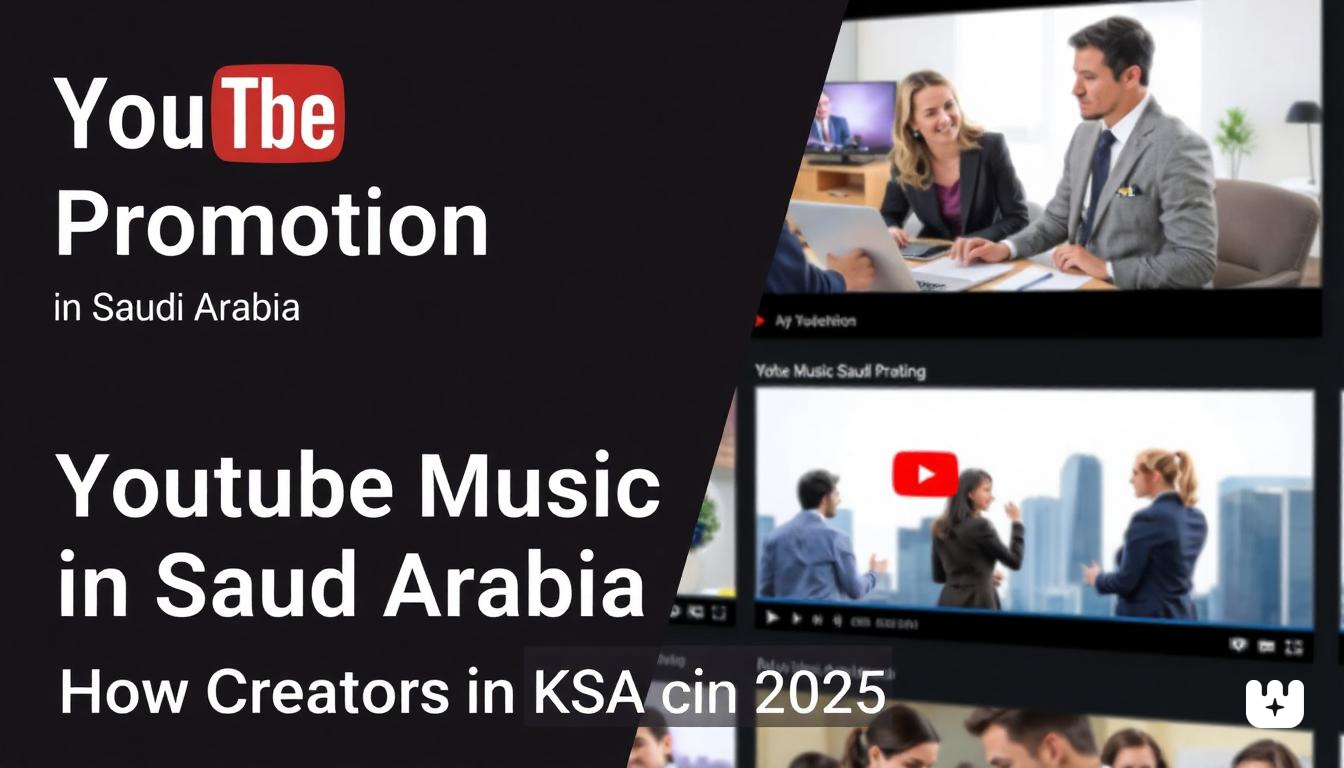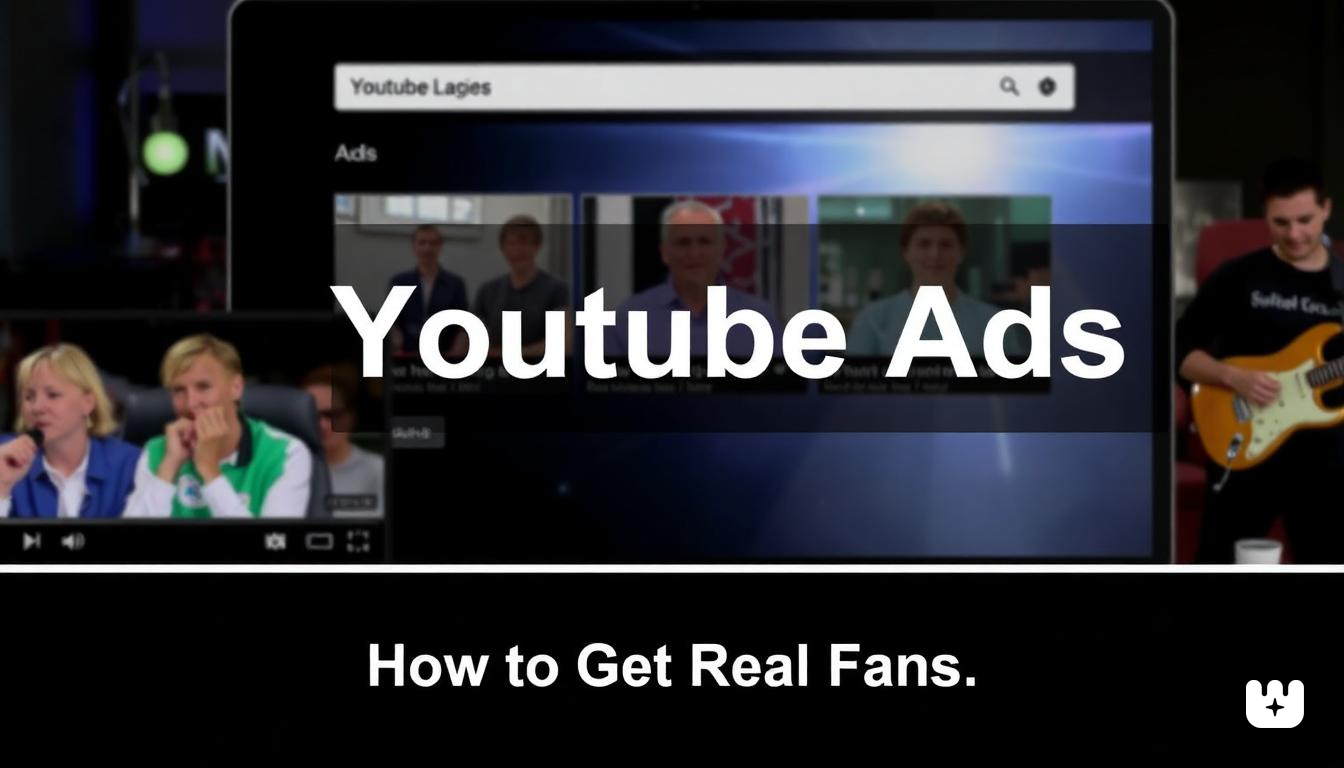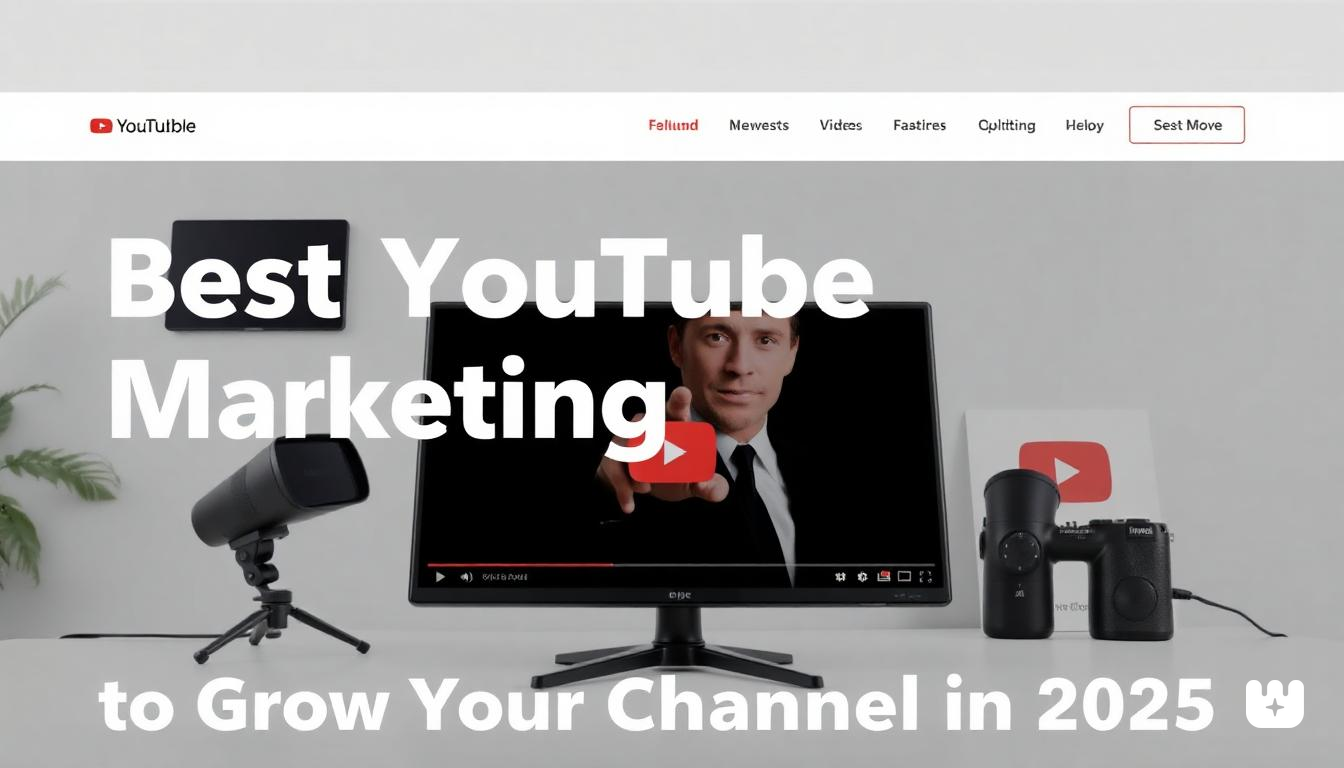In 2025's hyper-competitive YouTube landscape, random posting and hoping for the best no longer works. With over 2.9 billion monthly active users and 720,000+ hours of content uploaded daily, success requires more than just great videos—it demands a systematic YouTube marketing strategy that addresses everything from content planning to promotion and monetization.
This comprehensive guide will walk you through creating a customized strategy that generates real engagement and positions your content for potential viral growth, whether you're a creator, brand, musician, or influencer.
Why Strategic Planning Is Non-Negotiable in 2025
The YouTube algorithm and viewer behavior have both evolved dramatically in recent years. Several key factors make strategic planning essential:
- Increased competition: Nearly every niche has experienced a 300-500% increase in content volume since 2022
- Algorithm complexity: YouTube now evaluates content across 100+ engagement signals
- Shifting viewer habits: Attention spans continue to fragment while content expectations rise
- Multi-format necessity: Success requires mastering multiple content formats (long-form, Shorts, Community, etc.)
- Cross-platform integration: YouTube growth increasingly depends on strategic cross-platform promotion
According to the YouTube Creator Academy, channels with documented content strategies grow 4.5x faster than those without clear plans.
Step 1: Define Your Channel's Core Goals and Identity
Before diving into tactics, establish your channel's strategic foundation:
Clarify Your Primary Goal
Different goals require fundamentally different strategies:
- Brand building: Emphasizing consistent messaging and value communication
- Monetization: Focusing on watch time optimization and audience retention
- Community building: Prioritizing engagement and interaction
- Lead generation: Creating strategic conversion pathways
- Entertainment: Maximizing shareability and emotional response
- Education: Structuring searchable, solution-oriented content
Identify Your Unique Value Proposition
Successful channels clearly articulate what makes them irreplaceable:
- Specialized expertise: Demonstrating knowledge others don't possess
- Unique perspective: Offering fresh viewpoints on familiar topics
- Production quality: Creating visually distinctive content
- Personality: Showcasing authentic, relatable character traits
- Access: Providing insights into exclusive environments or information
- Storytelling approach: Developing a signature narrative style
Define Your Target Audience with Precision
Generic targeting leads to generic results. Define your audience through:
- Demographic details: Age, location, occupation, income level
- Psychographic factors: Values, beliefs, interests, lifestyle choices
- Content consumption habits: Preferred formats, watch times, engagement patterns
- Pain points and aspirations: Problems they're trying to solve or goals they want to achieve
- Platform behaviors: How they discover and interact with content
According to HubSpot research, channels that clearly define their target audience achieve 62% higher subscriber conversion rates than those targeting general viewers.
Step 2: Strategic Research and Competitive Analysis
Effective YouTube video marketing begins with comprehensive research:
Keyword Research Beyond the Basics
Go deeper than standard YouTube keyword tools:
- Search intent mapping: Identify whether users want information, tutorials, entertainment, or reviews
- Keyword clustering: Group related terms to identify content themes
- Competition difficulty assessment: Evaluate ranking difficulty for target terms
- Question mining: Extract common questions from comments, forums, and Q&A sites
- Trend forecasting: Identify emerging topics before they peak
Competitor Channel Analysis
Study successful channels in your niche to identify:
- Content gaps: Topics with high demand but limited quality coverage
- Format patterns: Which video types perform best (listicles, case studies, tutorials, etc.)
- Engagement triggers: Elements that consistently generate comments and shares
- Monetization methods: How similar creators generate revenue
- Growth trajectories: How quickly channels grew and which content accelerated growth
Audience Research
Develop deep audience insights through:
- Comment analysis: Extract patterns from comments on your videos and competitors' content
- Community polls: Ask direct questions about preferences and interests
- Analytics review: Identify demographic and behavioral patterns in your existing audience
- Social listening: Monitor discussions about topics in your niche across platforms
- Feedback mechanisms: Create structured ways to gather audience input
For a comprehensive guide to effective research techniques, check out our detailed article on organic YouTube promotion.
Step 3: Content Strategy Development
With research complete, develop a structured content approach:
Content Pillars Framework
Organize your content around 3-5 core themes that:
- Align with your expertise
- Address audience needs
- Have sustainable search volume
- Offer monetization potential
- Allow for content variety
Strategic Content Mix
Balance these four content types:
- Hero content: High-production flagship videos designed for broad reach (10% of output)
- Hub content: Regular series that build viewership habits (50-60% of output)
- Help content: Searchable, problem-solving content that drives discovery (20-30% of output)
- Heart content: Community-focused, relationship-building content (10-15% of output)
Content Calendar Development
Create a sustainable publishing schedule that includes:
- Publishing cadence: Realistic frequency based on your resources
- Strategic timing: Optimal publishing days and times for your audience
- Theme rotation: Systematic coverage of your content pillars
- Seasonal planning: Content aligned with annual trends and events
- Flexibility allowance: Space for trend-responsive content
A structured content calendar increases consistency—the single most important factor in channel growth according to YouTube's own research.
Step 4: Advanced SEO and Optimization Strategies
Maximize visibility through comprehensive optimization:
Title Engineering
Craft titles that balance searchability with click appeal:
- Keyword positioning: Place primary keywords in the first half of titles
- Emotional triggers: Incorporate curiosity, urgency, or utility
- Clarity emphasis: Ensure titles clearly communicate content value
- Length optimization: Aim for 50-60 characters to avoid truncation
- Searchable phrasing: Use terms viewers actually search for
Thumbnail Mastery
Develop a thumbnail strategy that includes:
- Brand consistency: Recognizable visual style across all content
- Text minimization: Limited text focused on key value points
- Contrast optimization: Clear visibility on mobile devices
- Emotional triggers: Facial expressions or situations that evoke curiosity
- A/B testing protocol: Systematic testing of different approaches
Description Optimization
Transform descriptions from afterthoughts to strategic assets:
- Front-loaded keywords: Place primary terms in the first 1-2 sentences
- Structured formatting: Use paragraphs, bullets, and spacing for readability
- Strategic timestamps: Add keyword-rich chapter markers
- Resource linking: Include relevant internal and external resources
- Call-to-action placement: Strategic CTAs for subscription, engagement, and external platforms
Tag Strategy
While tags have decreased in importance, strategic tagging still helps:
- Specificity prioritization: Use specific phrases over generic terms
- Variety balance: Mix broad, mid-tail, and long-tail keywords
- Competitor inclusion: Add 1-2 relevant competitor channel names
- Location consideration: Include location-specific tags when relevant
- Trending integration: Add trending terminology when contextually appropriate
For detailed guidance on implementing these optimization strategies, visit our comprehensive guide on how to promote a YouTube video for free.
Step 5: Multi-Format Strategy Implementation
Leverage all YouTube content formats for comprehensive coverage:
Long-Form Content Strategy
Optimize traditional videos for maximum impact:
- Optimal length determination: Find the sweet spot for your specific content category
- Pattern interruption planning: Strategic structure changes to maintain engagement
- Hook optimization: Perfect the critical first 15 seconds
- Retention triggering: Include forward references and open loops
- End screen strategy: Maximize session continuation
YouTube Shorts Approach
Integrate Shorts as a discovery and subscriber acquisition tool:
- Content repurposing: Transform long-form highlights into stand-alone Shorts
- Format-specific creation: Develop Shorts designed specifically for vertical viewing
- Hook prioritization: Capture attention in the first 1-2 seconds
- Trend participation: Strategic engagement with platform-wide Shorts trends
- Cross-promotion technique: Use Shorts to drive traffic to long-form content
Community Tab Utilization
Transform the Community tab from afterthought to strategic asset:
- Content teasing: Share behind-the-scenes glimpses of upcoming videos
- Audience research: Use polls to guide content decisions
- Engagement maintenance: Keep audience connected between uploads
- User-generated content solicitation: Encourage audience contributions
- Milestone celebration: Build community through shared achievements
Live Stream Integration
Incorporate live streaming for real-time engagement:
- Recurring programming: Establish predictable live events
- Interactive elements: Use polls, super chats, and Q&As strategically
- Community recognition: Acknowledge active community members
- Content repurposing plan: Transform live content into edited videos
- Monetization integration: Develop revenue-generating live formats
Step 6: Cross-Platform Promotion Framework
Extend your YouTube channel marketing beyond the platform:
Platform-Specific Content Adaptation
Customize YouTube content for each external platform:
- Instagram/TikTok strategy: Create native vertical highlights with YouTube CTAs
- Twitter approach: Share interesting quotes, statistics, or moments
- LinkedIn method: Position video content within professional contexts
- Facebook tactics: Optimize preview text and custom thumbnails for feed visibility
- Reddit approach: Provide value-first content focused on community contribution
Email Marketing Integration
Leverage email as a direct channel to your audience:
- List building mechanism: Create YouTube-specific lead magnets
- Broadcast timing: Coordinate email notifications with video publishing
- Content previewing: Generate excitement through exclusive previews
- Feedback solicitation: Gather content ideas and preferences
- Monetization integration: Promote products, services, or affiliate offers
Collaborative Growth Strategy
Develop a systematic approach to collaborations:
- Partner identification: Create a tiered list of potential collaborators
- Value proposition development: Clarify what you offer potential partners
- Outreach protocol: Establish a professional collaboration request process
- Format diversification: Explore various collaborative content types
- Cross-promotion agreement: Establish clear promotional expectations
Community Distribution Networks
Cultivate strategic relationships with content-sharing communities:
- Niche forum identification: Find communities where your content adds value
- Value-first approach: Establish reputation before promotion
- Platform-specific formatting: Adapt content presentation to community norms
- Engagement commitment: Participate genuinely beyond self-promotion
- Relationship building: Connect with key community members
For musicians specifically, we've created a specialized guide for cross-platform promotion in our article on YouTube ads for musicians.
Step 7: Strategic Paid Promotion
When and how to integrate paid advertising into your YouTube marketing strategy:
Content Selection for Promotion
Not all content deserves paid amplification. Prioritize:
- Pillar content: Comprehensive videos that showcase your value proposition
- High-retention content: Videos with proven audience retention
- Lead generation assets: Content with clear conversion pathways
- Audience-building content: Videos designed to attract your ideal viewers
- Monetization engines: Content that drives revenue through affiliate offers or product sales
YouTube Ads Strategy
Develop campaigns with creator-specific objectives:
- Audience building: Use in-stream ads to increase subscribers
- Content discovery: Leverage discovery ads for searchable content
- Brand awareness: Implement bumper ads for broad recognition
- Direct response: Create action-oriented ads with clear CTAs
- Remarketing focus: Target viewers who've engaged with your content
Budget Allocation Framework
Distribute promotional spending strategically:
- Testing budget: Allocate 20% to experimental campaigns
- Proven performer budget: Assign 50% to content with demonstrated results
- Platform diversification: Dedicate 20% to promoting on other platforms
- Remarketing allocation: Reserve 10% for re-engaging existing audiences
Performance Measurement Protocol
Establish clear metrics beyond views:
- Subscriber conversion rate: New subscribers per ad dollar spent
- Watch time generation: Minutes watched per promotional dollar
- Engagement quality: Comment and share rate from promoted content
- Secondary action completion: Website visits, email signups, or purchase conversions
- Long-term value assessment: Audience retention from ads vs. organic discovery
For a comprehensive breakdown of paid promotion options, check out our guide to top YouTube promotion services.
Step 8: Balancing Organic and Paid Growth
Develop an integrated approach that combines free and paid strategies:
Organic Foundation Building
Always prioritize these no-cost strategies:
- Consistent publishing: Maintain a reliable content schedule
- Community engagement: Respond to comments and foster discussion
- Metadata optimization: Perfect your titles, descriptions, and tags
- Cross-platform sharing: Distribute content across your existing channels
- Collaborative networking: Build relationships with fellow creators
Strategic Paid Acceleration
Add targeted paid promotion when:
- Launching key content: Give important videos an initial boost
- Breaking plateaus: Overcome growth stagnation periods
- Reaching new audiences: Access viewers outside your current reach
- Supporting monetization: Amplify content with revenue potential
- Testing new formats: Gather data on experimental content
Professional Promotion Consideration
For creators serious about growth, professional YouTube marketing services like Tube-Ads.Store offer significant advantages:
- Targeted audience matching: Connecting with viewers genuinely interested in your content category
- Real engagement delivery: Generating authentic views, comments, and subscriptions
- Algorithm-friendly promotion: Building signals that trigger YouTube's recommendation systems
- Customized campaign development: Creating promotion strategies tailored to specific content types
- ROI-focused approach: Emphasizing meaningful metrics beyond raw view counts
With over 9 years of experience as a leading YouTube marketing agency, Tube-Ads.Store specializes in delivering 100% real U.S. traffic that genuinely engages with content, setting it apart from services that provide low-quality views.
Step 9: Analytics and Optimization Framework
Transform data into strategic improvements:
Performance Review Protocol
Establish a regular analytics review schedule:
- Weekly snapshot analysis: Track key growth and engagement metrics
- Monthly deep dives: Identify patterns and optimization opportunities
- Quarterly strategy assessment: Evaluate overall approach effectiveness
- Content post-mortems: Analyze why videos over or underperformed
- Competition tracking: Monitor changes in competitor strategies
Metric Prioritization
Focus on these indicators rather than vanity metrics:
- Average view duration: The most critical algorithm signal
- Click-through rate: Thumbnail and title effectiveness
- Subscriber conversion rate: New subscribers per 1,000 views
- Returning viewer percentage: Audience loyalty indicator
- Engagement rate: Comments, likes, and shares per view
Iterative Improvement Process
Develop a systematic optimization approach:
- A/B testing protocol: Structured testing of thumbnails, titles, and formats
- Content evolution framework: Process for refining successful content types
- Feedback incorporation system: Method for implementing viewer suggestions
- Performance-based planning: Letting data guide content decisions
- Trend adaptation process: Protocol for responding to platform changes
According to Backlinko's YouTube marketing research, channels that regularly optimize based on analytics data grow 76% faster than those that don't.
Creating Your Custom YouTube Growth Plan
Now that we've covered the essential elements, here's how to build your personalized viral growth plan:
1. Strategy Documentation
Create a written document that includes:
- Your channel's core goals and value proposition
- Target audience definition and psychographics
- Content pillar framework and publishing calendar
- Optimization protocols for all metadata elements
- Cross-platform promotion strategy
- Analytics review schedule
2. 90-Day Implementation Roadmap
Develop a phased approach focusing on:
- Days 1-30: Foundation building and content optimization
- Days 31-60: Community development and cross-promotion
- Days 61-90: Strategic paid promotion and collaboration
3. Resource Allocation Planning
Realistically assess and assign your available resources:
- Production time and equipment
- Content creation capabilities
- Engagement bandwidth
- Promotional budget
- Analytics review time
4. Success Measurement Framework
Establish clear, achievable goals for:
- Subscriber growth rate
- Average view duration
- Engagement metrics
- Revenue generation
- Brand partnership opportunities
Conclusion: From Strategy to Viral Success
In 2025's YouTube ecosystem, viral success rarely happens by accident. Channels that experience rapid growth almost universally follow strategic plans that address content creation, audience development, and promotional amplification.
By implementing the framework outlined in this guide, you've positioned your channel to capitalize on both algorithm advantages and audience connection—the two non-negotiable elements of sustainable YouTube growth.
For creators ready to accelerate their journey, combining these organic strategies with professional promotion from Tube-Ads.Store provides the perfect balance of foundation building and strategic amplification.
Remember: A documented YouTube marketing strategy isn't just nice to have—it's the difference between struggling for visibility and building a channel with genuine viral potential.
What element of your YouTube strategy will you implement first? Share your plans and questions in the comments below!
This guide is updated regularly to reflect the latest YouTube algorithm changes and promotion strategies. Last updated: April 2025.


